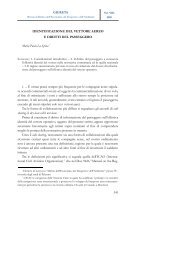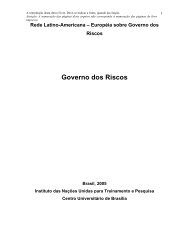The Old and the New Limits to Freedom of Contract in Europe
The Old and the New Limits to Freedom of Contract in Europe
The Old and the New Limits to Freedom of Contract in Europe
You also want an ePaper? Increase the reach of your titles
YUMPU automatically turns print PDFs into web optimized ePapers that Google loves.
<strong>The</strong> <strong>Old</strong> <strong>and</strong> <strong>the</strong> <strong>New</strong> <strong>Limits</strong> <strong>to</strong> <strong>Freedom</strong><br />
<strong>of</strong> <strong>Contract</strong> <strong>in</strong> <strong>Europe</strong><br />
MARIA ROSARIA MARELLA*<br />
Abstract: <strong>The</strong> structure <strong>of</strong> <strong>the</strong> relationship between <strong>the</strong> <strong>in</strong>dividual <strong>and</strong> <strong>the</strong> community or <strong>the</strong><br />
state is not def<strong>in</strong>ite at <strong>the</strong> <strong>Europe</strong>an level. However this is a crucial po<strong>in</strong>t for <strong>the</strong> def<strong>in</strong>ition<br />
<strong>of</strong> <strong>the</strong> ground-rules <strong>in</strong> private law, consider<strong>in</strong>g, <strong>in</strong> particular, that <strong>Europe</strong>an jurists normally<br />
ascribe <strong>to</strong> private law a constitutive role both <strong>in</strong> <strong>the</strong> function<strong>in</strong>g <strong>of</strong> <strong>the</strong> <strong>in</strong>tegrated market<br />
<strong>and</strong> <strong>in</strong> <strong>the</strong> construction <strong>of</strong> a <strong>Europe</strong>an citizenship. In contract law <strong>the</strong> relationship between<br />
<strong>the</strong> <strong>in</strong>dividual <strong>and</strong> <strong>the</strong> community or <strong>the</strong> state is ma<strong>in</strong>ly designated by <strong>the</strong> def<strong>in</strong>ition <strong>of</strong> freedom<br />
<strong>of</strong> contract <strong>and</strong> its limits. On <strong>the</strong> scene <strong>of</strong> <strong>Europe</strong>an law, however, <strong>the</strong> question <strong>of</strong> <strong>the</strong><br />
limits <strong>of</strong> freedom <strong>of</strong> contract f<strong>in</strong>ds very different <strong>and</strong> contrast<strong>in</strong>g solutions. This article identifies<br />
three different modes <strong>of</strong> approach<strong>in</strong>g <strong>the</strong> question, which we have experienced <strong>and</strong> are<br />
currently experienc<strong>in</strong>g <strong>in</strong> <strong>Europe</strong>; <strong>the</strong>y are respectively described as <strong>the</strong> paternalistic, <strong>the</strong> social<br />
<strong>and</strong> <strong>the</strong> perfectionist model. Although recent developments <strong>in</strong> <strong>the</strong> harmonisation process<br />
show a propensity for a comb<strong>in</strong>ation <strong>of</strong> <strong>the</strong> first <strong>and</strong> <strong>the</strong> third model, this paper argues that<br />
<strong>the</strong> social model still has a chance <strong>to</strong> achieve a key role <strong>in</strong> <strong>Europe</strong>an contract law.<br />
I. Introduction<br />
Last August, while hav<strong>in</strong>g a glass <strong>of</strong> w<strong>in</strong>e on <strong>the</strong> porch <strong>of</strong> his wonderful<br />
eighteenth-century house <strong>in</strong> <strong>the</strong> <strong>New</strong> Engl<strong>and</strong> countryside, an American<br />
colleague observed: ‘It is still puzzl<strong>in</strong>g <strong>to</strong> me why <strong>Europe</strong>an jurists are work<strong>in</strong>g<br />
so hard on <strong>the</strong> harmonisation <strong>of</strong> private law. Why do you th<strong>in</strong>k you need<br />
it so badly? In <strong>the</strong> USA we don’t have any harmonised law <strong>of</strong> contracts, <strong>to</strong>rt<br />
law or family law, never<strong>the</strong>less <strong>the</strong> market functions <strong>and</strong> we are a nation after<br />
all!’ <strong>The</strong> answer <strong>to</strong> this question is so complex that I don’t even dare <strong>to</strong> try <strong>to</strong><br />
reply … We are certa<strong>in</strong>ly not a nation; maybe we hope <strong>to</strong> build our own<br />
through harmonisation. It seems <strong>to</strong> me that at least one aspect <strong>of</strong> <strong>the</strong> problem<br />
is <strong>the</strong> uncerta<strong>in</strong>ty <strong>and</strong> <strong>the</strong> vagueness that characterises <strong>the</strong> structure <strong>of</strong> <strong>the</strong><br />
relationship between <strong>the</strong> <strong>in</strong>dividual <strong>and</strong> <strong>the</strong> community/<strong>the</strong> state at <strong>the</strong> <strong>Europe</strong>an<br />
level, a relationship which is crucial for establish<strong>in</strong>g <strong>the</strong> ground rules <strong>in</strong><br />
private law, consider<strong>in</strong>g, <strong>in</strong> particular, that we <strong>Europe</strong>an jurists normally<br />
ascribe <strong>to</strong> private law a constitutive role both <strong>in</strong> <strong>the</strong> function<strong>in</strong>g <strong>of</strong> <strong>the</strong> <strong>in</strong>tegrated<br />
market <strong>and</strong> <strong>in</strong> <strong>the</strong> construction <strong>of</strong> a <strong>Europe</strong>an citizenship. So my hypo<strong>the</strong>sis<br />
is that we need <strong>to</strong> harmonise private law also <strong>in</strong> order <strong>to</strong> establish what<br />
<strong>the</strong> relation between <strong>the</strong> <strong>in</strong>dividual <strong>and</strong> <strong>the</strong> community <strong>in</strong> <strong>Europe</strong> should be.<br />
* Pr<strong>of</strong>essor <strong>of</strong> private law, University <strong>of</strong> Perugia.
258 Maria Rosaria Marella<br />
ERCL 2/2006<br />
Now <strong>in</strong> contract law <strong>the</strong> relationship between <strong>the</strong> <strong>in</strong>dividual <strong>and</strong> <strong>the</strong> community<br />
or <strong>the</strong> state is ma<strong>in</strong>ly designated by <strong>the</strong> def<strong>in</strong>ition <strong>of</strong> freedom <strong>of</strong> contract<br />
<strong>and</strong> its limits. 1 Public policy is used <strong>to</strong> def<strong>in</strong>e a general limit <strong>to</strong> freedom <strong>of</strong><br />
contract. On <strong>the</strong> scene <strong>of</strong> <strong>Europe</strong>an law, however, <strong>the</strong> question <strong>of</strong> limits <strong>of</strong><br />
freedom <strong>of</strong> contract f<strong>in</strong>ds very different <strong>and</strong> contrast<strong>in</strong>g solutions. In this<br />
paper I describe three different modes <strong>of</strong> approach<strong>in</strong>g <strong>the</strong> question, which we<br />
have experienced <strong>and</strong> are currently experienc<strong>in</strong>g <strong>in</strong> <strong>Europe</strong>; three models <strong>of</strong><br />
sett<strong>in</strong>g <strong>the</strong> limits <strong>of</strong> freedom <strong>of</strong> contract that are related <strong>to</strong> three different<br />
ways <strong>of</strong> conceiv<strong>in</strong>g <strong>the</strong> relationship between <strong>the</strong> <strong>in</strong>dividual <strong>and</strong> <strong>the</strong> community.<br />
I will def<strong>in</strong>e <strong>the</strong>m respectively <strong>the</strong> paternalistic, <strong>the</strong> social <strong>and</strong> <strong>the</strong> perfectionist<br />
model. My sense is that all <strong>the</strong>se three models still coexist <strong>in</strong> our<br />
legal systems or at least <strong>in</strong> some <strong>of</strong> <strong>the</strong>m, although I will describe <strong>the</strong>m as<br />
develop<strong>in</strong>g one after ano<strong>the</strong>r <strong>in</strong> a diachronic dimension.<br />
<strong>Europe</strong>an contract law has <strong>to</strong> cope with <strong>the</strong>se models, choose one <strong>of</strong> <strong>the</strong>m or<br />
possibly none <strong>of</strong> <strong>the</strong>m … .<br />
II. Harmonis<strong>in</strong>g <strong>the</strong> <strong>Limits</strong> <strong>of</strong> <strong>Freedom</strong> <strong>of</strong> <strong>Contract</strong>: <strong>the</strong> Techniques<br />
Before <strong>of</strong> describ<strong>in</strong>g <strong>the</strong> three models <strong>and</strong> <strong>the</strong>ir respective problems, I will<br />
talk briefly about <strong>the</strong> possible techniques <strong>of</strong> harmonis<strong>in</strong>g rules or pr<strong>in</strong>ciples<br />
regard<strong>in</strong>g <strong>the</strong> limits <strong>of</strong> freedom <strong>of</strong> contract. By this expression we usually<br />
underst<strong>and</strong> <strong>the</strong> legal problems that m<strong>and</strong>a<strong>to</strong>ry rules <strong>and</strong> general clauses like<br />
<strong>the</strong> bonus mores, ordre public <strong>and</strong> public policy normally confront. Although<br />
not all <strong>the</strong> <strong>Europe</strong>an civil law systems implement <strong>the</strong> same st<strong>and</strong>ards (no<br />
ordre public clause is provided by <strong>the</strong> German BGB, for example) this circumstance<br />
does not make any significant difference as <strong>to</strong> <strong>the</strong> extent <strong>of</strong> freedom<br />
<strong>of</strong> contract. <strong>Limits</strong> <strong>to</strong> freedom <strong>of</strong> contract are enforced <strong>in</strong> <strong>the</strong> different<br />
legal systems <strong>in</strong> order <strong>to</strong> respond <strong>to</strong> several <strong>and</strong> comparable needs: basically<br />
<strong>to</strong> protect <strong>the</strong> public <strong>in</strong>terest <strong>in</strong> efficiency, morality or equity that might or<br />
might not overlap with <strong>the</strong> <strong>in</strong>terests <strong>of</strong> <strong>the</strong> parties, <strong>the</strong> <strong>in</strong>terests <strong>of</strong> one party<br />
represent<strong>in</strong>g a specific(ally protected) social group, or <strong>the</strong> <strong>in</strong>terests <strong>of</strong> third<br />
parties. 2 However, <strong>the</strong> national solutions <strong>to</strong> <strong>the</strong>se needs can be <strong>and</strong> actually<br />
are disparate.<br />
1 S. D. Grimm, ‘Soziale, wirtschaftliche und politische Voraussetzungen der Vertragsfreiheit.<br />
E<strong>in</strong>e vergleichende Skizze’, <strong>in</strong> La formazione s<strong>to</strong>rica del dirit<strong>to</strong> moderno <strong>in</strong> Europa:<br />
atti del terzo congresso <strong>in</strong>ternazionale della Società Italiana di S<strong>to</strong>ria del Dirit<strong>to</strong>, vol III<br />
(Firenze: Olschki, 1977) 1221, 1224: ‘welche Verträge frei abgeschlossen werden können,<br />
charakterisiert darum e<strong>in</strong>e Gesellschaft’.<br />
2 C. G. Paulus / W. Zenker, ‘Grenzen der Privatau<strong>to</strong>nomie’ (2001) Juristische Schulung 1.
ERCL 2/2006 <strong>The</strong> <strong>Old</strong> <strong>and</strong> <strong>the</strong> <strong>New</strong> <strong>Limits</strong> <strong>to</strong> <strong>Freedom</strong> <strong>of</strong> <strong>Contract</strong> <strong>in</strong> <strong>Europe</strong><br />
259<br />
Now, on <strong>the</strong> one h<strong>and</strong>, <strong>the</strong> phenomenon <strong>of</strong> an <strong>in</strong>creas<strong>in</strong>g contractualization<br />
<strong>of</strong> social life makes <strong>the</strong> def<strong>in</strong>ition <strong>of</strong> limits <strong>of</strong> freedom <strong>of</strong> contract urgent, as<br />
new spheres <strong>of</strong> social life, traditionally imag<strong>in</strong>ed as external <strong>to</strong> <strong>the</strong> market<br />
realm, are progressively ‘corrupted’ by a market rationale. Undoubtedly <strong>the</strong><br />
def<strong>in</strong>ition <strong>of</strong> limits <strong>to</strong> freedom <strong>of</strong> contract is an issue at stake <strong>in</strong> <strong>the</strong> harmonisation<br />
process. Some provisions <strong>of</strong> <strong>the</strong> <strong>Europe</strong>an Charter <strong>of</strong> Fundamental<br />
Rights clearly show that this problem has already been perceived <strong>and</strong> confronted<br />
at <strong>the</strong> <strong>Europe</strong>an level. By <strong>in</strong>troduc<strong>in</strong>g a market-<strong>in</strong>alienability rule for<br />
body parts, Article 3 <strong>of</strong> <strong>the</strong> Charter aims <strong>to</strong> ban <strong>the</strong> very idea <strong>of</strong> exchange<br />
from this area, notwithst<strong>and</strong><strong>in</strong>g <strong>the</strong> <strong>in</strong>creas<strong>in</strong>g impact <strong>of</strong> biotechnologies on<br />
society both from a cultural <strong>and</strong> an economic po<strong>in</strong>t <strong>of</strong> view. Article 8 restricts<br />
<strong>the</strong> viability <strong>of</strong> market transactions concern<strong>in</strong>g personal data by impos<strong>in</strong>g<br />
special requirements for <strong>the</strong>ir circulation. <strong>The</strong> general pr<strong>in</strong>ciple <strong>of</strong> human<br />
dignity sanctioned by Article 1 is a potential source <strong>of</strong> new limits on freedom<br />
<strong>of</strong> contract <strong>in</strong> <strong>Europe</strong>an law. 3<br />
On <strong>the</strong> o<strong>the</strong>r h<strong>and</strong>, <strong>the</strong> peculiarity <strong>of</strong> <strong>the</strong> <strong>to</strong>pic makes its harmonisation quite<br />
problematic. Unlike most <strong>to</strong>pics <strong>in</strong> contract law, <strong>the</strong> question <strong>of</strong> limits <strong>of</strong> freedom<br />
<strong>of</strong> contract is widely perceived as a not a –merely technical question; on<br />
<strong>the</strong> contrary it is regarded as a matter <strong>of</strong> highly political choices, <strong>the</strong> harmonisation<br />
<strong>of</strong> which <strong>in</strong>volves an <strong>in</strong>trusion <strong>in</strong><strong>to</strong> <strong>the</strong> <strong>in</strong>tangible sphere <strong>of</strong> national<br />
sovereignty. For this reason <strong>the</strong> harmonisation projects have been so far very<br />
cautious or even laconic <strong>in</strong> this respect. Article 2 <strong>of</strong> <strong>the</strong> Pavia project <strong>of</strong> a<br />
Code Européen des Contrats mentions m<strong>and</strong>a<strong>to</strong>ry rules, bonus mores <strong>and</strong> ordre<br />
public provided by <strong>the</strong> Code itself, by EC law <strong>and</strong> by <strong>the</strong> laws <strong>of</strong> Member<br />
States as general limits <strong>of</strong> freedom <strong>of</strong> contract. <strong>The</strong> implementation <strong>of</strong> such a<br />
provision presupposes a body <strong>of</strong> common background rules, both <strong>of</strong> judicial<br />
<strong>and</strong> legislative orig<strong>in</strong> (crim<strong>in</strong>al law rules, adm<strong>in</strong>istrative pronouncements etc)<br />
<strong>and</strong> a uniform <strong>in</strong>terpretation <strong>of</strong> general clauses, whose vagueness makes <strong>the</strong><br />
harmonisation on this specific po<strong>in</strong>t <strong>in</strong>feasible.<br />
<strong>The</strong> Pr<strong>in</strong>ciples <strong>of</strong> <strong>Europe</strong>an <strong>Contract</strong> Law (PECL) came late <strong>to</strong> this po<strong>in</strong>t.<br />
<strong>The</strong> first move was <strong>to</strong> leave <strong>the</strong> question aside given <strong>the</strong> great variety among<br />
<strong>the</strong> legal systems <strong>of</strong> Member States. Later <strong>the</strong> solution was found <strong>in</strong> <strong>the</strong> follow<strong>in</strong>g<br />
(<strong>and</strong> predictable) formula: ‘A contract is <strong>of</strong> no effect <strong>to</strong> <strong>the</strong> extent that it is<br />
contrary <strong>to</strong> pr<strong>in</strong>ciples recognised as fundamental <strong>in</strong> <strong>the</strong> laws <strong>of</strong> Member States<br />
<strong>of</strong> <strong>the</strong> <strong>Europe</strong>an Union’ (Article 15: 101). <strong>The</strong> provision implies a conver-<br />
3 For this schematization <strong>of</strong> <strong>the</strong> limits <strong>to</strong> freedom <strong>of</strong> contract set by <strong>the</strong> EU Charter see<br />
G. Resta, ‘Diritti della personalità e limiti della libertà contrattuale nell’evoluzione del<br />
dirit<strong>to</strong> europeo’, paper presented at <strong>the</strong> conference ‘Diritti fondamentali e formazione<br />
del dirit<strong>to</strong> priva<strong>to</strong> europeo’, Università di Roma Tre, 28 June 2002, on file with author.
260 Maria Rosaria Marella<br />
ERCL 2/2006<br />
gence <strong>of</strong> <strong>the</strong> EU Member States around what has <strong>to</strong> be conceptualised as fundamental<br />
limits <strong>of</strong> freedom <strong>of</strong> contract. Here one faces a general problem that<br />
usually arises with <strong>the</strong> so-called common core approach: from <strong>the</strong> po<strong>in</strong>t <strong>of</strong><br />
view <strong>of</strong> methodological accuracy, one ought <strong>to</strong> establish what <strong>the</strong> rules are,<br />
what <strong>the</strong> exceptions are, <strong>and</strong> separate sharply <strong>the</strong> rule from <strong>the</strong> exception for<br />
each <strong>Europe</strong>an legal system, <strong>in</strong> order <strong>to</strong> identify a framework <strong>of</strong> converg<strong>in</strong>g<br />
rules provid<strong>in</strong>g comparable solutions <strong>to</strong> <strong>the</strong> same problems. In any case, this<br />
method usually leads <strong>to</strong> <strong>the</strong> acceptance <strong>of</strong> any rule that seems <strong>to</strong> be shared by<br />
all <strong>the</strong> national systems <strong>in</strong> question, <strong>and</strong> <strong>to</strong> <strong>the</strong> exclusion <strong>of</strong> whatever national<br />
solution can be seen as an exception. <strong>The</strong> result merges with <strong>the</strong> m<strong>in</strong>imum<br />
common fac<strong>to</strong>r strategy, that is <strong>the</strong> attempt commonly pursued by <strong>the</strong> EU<br />
<strong>in</strong>stitutions <strong>to</strong> create a <strong>Europe</strong>an law that does not collide with any national<br />
legal rule, pr<strong>in</strong>ciple or <strong>in</strong>stitution, <strong>in</strong> order <strong>to</strong> preserve <strong>the</strong> idea <strong>of</strong> <strong>the</strong> <strong>in</strong>tangibleness<br />
<strong>of</strong> national sovereignty on legal issues supposedly <strong>in</strong>fluenced by<br />
policy-mak<strong>in</strong>g. 4<br />
At this very po<strong>in</strong>t, however, a second, specific problem arises: <strong>the</strong> comb<strong>in</strong>ation<br />
<strong>of</strong> <strong>the</strong> common core approach with <strong>the</strong> m<strong>in</strong>imum common fac<strong>to</strong>r strategy<br />
necessarily leads <strong>to</strong> an extremely narrow notion <strong>of</strong> freedom <strong>of</strong> contract.<br />
This seems <strong>to</strong> be an undesirable <strong>and</strong> <strong>in</strong>feasible outcome <strong>in</strong> <strong>the</strong> light <strong>of</strong> <strong>the</strong><br />
latest developments <strong>in</strong> <strong>Europe</strong>an law. It would even clash with <strong>the</strong> current<br />
general tendency <strong>to</strong>ward an <strong>in</strong>creas<strong>in</strong>g contractualization <strong>of</strong> social life <strong>and</strong><br />
aga<strong>in</strong>st a common underst<strong>and</strong><strong>in</strong>g <strong>of</strong> contracts ‘as a facility for exp<strong>and</strong><strong>in</strong>g<br />
valuable choices <strong>and</strong> as provid<strong>in</strong>g <strong>the</strong> necessary security for <strong>the</strong> pursuit <strong>of</strong><br />
more detailed plans <strong>in</strong> life.’ 5<br />
Let us consider for <strong>in</strong>stance <strong>the</strong> legal treatment <strong>of</strong> prostitution <strong>and</strong> related<br />
commercial activities <strong>in</strong> different Member States: prostitution is no longer<br />
crim<strong>in</strong>alised <strong>in</strong> <strong>the</strong> Ne<strong>the</strong>rl<strong>and</strong>s, Belgium <strong>and</strong> <strong>in</strong> Germany. Accord<strong>in</strong>g <strong>to</strong> <strong>the</strong>se<br />
laws (explicitly <strong>in</strong> <strong>the</strong> German Prostitutionsgesetz) 6 <strong>the</strong> contract between <strong>the</strong><br />
prostitute <strong>and</strong> <strong>the</strong> client is enforceable. In addition, any o<strong>the</strong>r k<strong>in</strong>d <strong>of</strong> (not<br />
o<strong>the</strong>rwise crim<strong>in</strong>alised) sex-work enterprises (like sex-chat l<strong>in</strong>es, peepshows,<br />
etc) can be supported by enforceable contracts <strong>and</strong>, accord<strong>in</strong>g <strong>to</strong> some <strong>in</strong>terpreters,<br />
even agreements between spouses or partners concern<strong>in</strong>g sexual<br />
<strong>in</strong>tercourse <strong>in</strong>side <strong>and</strong> outside <strong>of</strong> marriage or cohabitation will be held as<br />
valid, as <strong>the</strong> question at stake is no longer <strong>the</strong> possibility <strong>of</strong> tak<strong>in</strong>g money<br />
4 On <strong>the</strong> multiple strategies <strong>in</strong> <strong>the</strong> harmonization process see M. R. Marella, ‘<strong>The</strong> Non-<br />
Subversive Function <strong>of</strong> <strong>Europe</strong>an Private Law: <strong>The</strong> Case <strong>of</strong> Harmonisation <strong>of</strong> Family<br />
Law’ (2006) 12 <strong>Europe</strong>an Law Journal 78–105.<br />
5 H. Coll<strong>in</strong>s, <strong>The</strong> Law <strong>of</strong> <strong>Contract</strong>s (London: Butterworths, 4 th ed., 2003) 106.<br />
6 Gesetz zur Regelung der Rechtsverhältnisse der Prostituierten, 20 December 2001, Bundesgesetzblatt<br />
2001 I, 3983.
ERCL 2/2006 <strong>The</strong> <strong>Old</strong> <strong>and</strong> <strong>the</strong> <strong>New</strong> <strong>Limits</strong> <strong>to</strong> <strong>Freedom</strong> <strong>of</strong> <strong>Contract</strong> <strong>in</strong> <strong>Europe</strong><br />
261<br />
from bodily services accord<strong>in</strong>g <strong>to</strong> <strong>the</strong> law, but ra<strong>the</strong>r turn<strong>in</strong>g sexual transactions<br />
<strong>in</strong><strong>to</strong> enforceable contracts.<br />
In contrast, o<strong>the</strong>r Member States have enacted a <strong>to</strong>tal (Sweden) or partial<br />
(France) abolitionist policy. Consequently not only <strong>the</strong> prostitute/client<br />
transactions, but also commercial contracts even <strong>in</strong>directly related <strong>to</strong> prostitution<br />
(like l<strong>and</strong>lord/tenant contractual relations, accord<strong>in</strong>g <strong>to</strong> <strong>the</strong> dom<strong>in</strong>ant<br />
<strong>in</strong>terpretation <strong>in</strong> French case law) 7 are treated as void.<br />
Now, <strong>the</strong> comb<strong>in</strong>ation <strong>of</strong> <strong>the</strong> common core approach with <strong>the</strong> m<strong>in</strong>imum<br />
common fac<strong>to</strong>r strategy would require sett<strong>in</strong>g <strong>the</strong> notion <strong>of</strong> freedom <strong>of</strong> contract<br />
– <strong>in</strong> reference <strong>to</strong> sexual transactions <strong>and</strong> <strong>the</strong> like – at <strong>the</strong> level established<br />
by Swedish law. In o<strong>the</strong>r words, <strong>the</strong> consequence <strong>of</strong> harmonis<strong>in</strong>g <strong>the</strong> notion<br />
<strong>of</strong> immoral/illegal contract would be <strong>to</strong> select <strong>and</strong> enforce <strong>the</strong> narrowest<br />
notion <strong>of</strong> freedom <strong>of</strong> contract among those enacted <strong>in</strong> <strong>Europe</strong>. However, this<br />
outcome conflicts with <strong>the</strong> <strong>in</strong>creas<strong>in</strong>gly common idea that courts should<br />
enforce contracts <strong>in</strong> respect <strong>of</strong> all types <strong>of</strong> social relations, as long as <strong>the</strong>y do<br />
not break conventional moral st<strong>and</strong>ards <strong>and</strong> do not frustrate <strong>the</strong> fair distributive<br />
scheme. 8 Moreover, <strong>in</strong> <strong>the</strong> Jany case, 9 <strong>the</strong> ECJ has followed <strong>the</strong> opposite<br />
po<strong>in</strong>t <strong>of</strong> view as far as <strong>the</strong> relation between prostitution <strong>and</strong> <strong>the</strong> market is<br />
concerned! More precisely <strong>the</strong> Court has stated that prostitution is not<br />
contrary <strong>to</strong> public policy <strong>in</strong> <strong>the</strong> EC <strong>and</strong> sex-workers enjoy freedom <strong>of</strong> movement<br />
<strong>and</strong> establishment with<strong>in</strong> <strong>the</strong> <strong>Europe</strong>an Union borders.<br />
III. <strong>The</strong> <strong>Limits</strong> <strong>of</strong> <strong>Freedom</strong> <strong>of</strong> <strong>Contract</strong> <strong>in</strong> <strong>Europe</strong>: <strong>the</strong> Models<br />
1. <strong>The</strong> Paternalistic Model<br />
This is <strong>the</strong> most traditional model. <strong>The</strong> ideological framework is <strong>the</strong> <strong>in</strong>dividualism<br />
<strong>of</strong> Classical Legal Thought. <strong>The</strong> state is entitled <strong>to</strong> <strong>in</strong>terfere with selfdeterm<strong>in</strong>ation<br />
<strong>of</strong> <strong>in</strong>dividuals (freedom <strong>of</strong> contract) as long as its <strong>in</strong>tervention<br />
is legitimated by <strong>the</strong> superior moral authority <strong>of</strong> <strong>the</strong> law <strong>and</strong> is restricted<br />
<strong>to</strong> very narrow ambits. <strong>The</strong> law enforces <strong>the</strong> free will <strong>of</strong> <strong>the</strong> parties unless it<br />
collides with various <strong>in</strong>terests pursued by <strong>the</strong> state.<br />
<strong>Contract</strong>s are basically set aside when <strong>the</strong>y threaten <strong>the</strong> <strong>in</strong>tegrity <strong>of</strong> <strong>the</strong> state<br />
<strong>and</strong> its <strong>in</strong>stitutions (by res<strong>to</strong>r<strong>in</strong>g, for example, feudal structures) or funda-<br />
7 S. M. Iacub / P. Maniglier, Antimanuel d’éducation sexuelle (Rosny Cedex: Bréal, 2005)<br />
236.<br />
8 Coll<strong>in</strong>s, n 5 above, 99.<br />
9 Case 268/99 Jany v Staatsecretaris van Justitutie, ECJ 20 November 2001.
262 Maria Rosaria Marella<br />
ERCL 2/2006<br />
mental freedoms <strong>and</strong> rights <strong>of</strong> <strong>the</strong> parties (contracts restrict<strong>in</strong>g personal or<br />
sexual liberty, for <strong>in</strong>stance). In <strong>the</strong> latter case, <strong>the</strong> state (courts or legislature)<br />
is supposed <strong>to</strong> decide better than <strong>in</strong>dividuals about <strong>the</strong>ir own <strong>in</strong>terests: restrictions<br />
on a person’s choice are imposed for his/her own good. This is<br />
what is normally meant by ‘paternalism’. <strong>The</strong> classic liberal argument runs<br />
this way: ‘(T)he reason for not <strong>in</strong>terfer<strong>in</strong>g, unless for <strong>the</strong> sake <strong>of</strong> o<strong>the</strong>rs, with<br />
a person’s voluntary acts is consideration for his liberty … But by sell<strong>in</strong>g<br />
himself for a slave, one abdicates his liberty … <strong>The</strong> pr<strong>in</strong>ciple <strong>of</strong> freedom cannot<br />
require that he should be free not <strong>to</strong> be free’. 10<br />
<strong>Limits</strong> <strong>to</strong> freedom <strong>of</strong> contract are generally <strong>in</strong>troduced <strong>in</strong> order <strong>to</strong> protect <strong>the</strong><br />
public <strong>in</strong>terest for <strong>the</strong> purposes <strong>of</strong> efficiency, morality or equity <strong>and</strong>/or <strong>to</strong><br />
protect def<strong>in</strong>ite <strong>in</strong>terests <strong>of</strong> <strong>the</strong> parties, <strong>of</strong> <strong>the</strong> one party represent<strong>in</strong>g a specific<br />
social group, or specific <strong>in</strong>terests <strong>of</strong> third parties, which are not directly<br />
<strong>in</strong>volved <strong>in</strong> <strong>the</strong> contract, but could never<strong>the</strong>less be affected by it: <strong>in</strong> all <strong>the</strong>se<br />
cases <strong>the</strong> legal relationship at issue cannot be ruled by any contract (see, as an<br />
example, <strong>the</strong> nullity <strong>of</strong> ‘pactes sur succession future’ <strong>in</strong> <strong>the</strong> French model) or<br />
by a contract that diverges from <strong>the</strong> substantive terms imposed by <strong>the</strong> state as<br />
part <strong>of</strong> a scheme <strong>of</strong> regulation (see <strong>the</strong> Erbvertrag <strong>in</strong> <strong>the</strong> German model, for<br />
<strong>in</strong>stance). <strong>The</strong>se are <strong>the</strong> basic explanations for limits <strong>of</strong> freedom <strong>of</strong> contract<br />
endorsed <strong>in</strong> <strong>the</strong> fields <strong>of</strong> family law, succession law <strong>and</strong> personality rights, as<br />
well as for limits imposed <strong>to</strong> transactions concern<strong>in</strong>g bodily <strong>in</strong>tegrity, body<br />
parts <strong>and</strong> sexuality.<br />
<strong>The</strong> idea underly<strong>in</strong>g this model is that <strong>the</strong> ma<strong>in</strong> function exerted by law <strong>in</strong><br />
sett<strong>in</strong>g limits <strong>to</strong> freedom <strong>of</strong> contract is <strong>to</strong> trace a sharp divide between what is<br />
<strong>in</strong>side/what is outside <strong>of</strong> <strong>the</strong> market, <strong>the</strong> first realm be<strong>in</strong>g mostly ruled by<br />
laissez faire, <strong>the</strong> latter by <strong>the</strong> <strong>in</strong>tervention <strong>of</strong> <strong>the</strong> state accord<strong>in</strong>g <strong>to</strong> a paternalistic<br />
approach. Here <strong>the</strong> state curtails personal choices with <strong>the</strong> goal <strong>of</strong> satisfy<strong>in</strong>g<br />
<strong>the</strong> <strong>in</strong>dividual’s deep preferences. 11<br />
In <strong>the</strong> era <strong>of</strong> <strong>the</strong> so called constitutionalization <strong>of</strong> private law, all private law<br />
fields <strong>and</strong> contract law, <strong>in</strong> particular, are now re<strong>in</strong>terpreted <strong>in</strong> <strong>the</strong> light <strong>of</strong> <strong>the</strong><br />
constitutions, <strong>and</strong> general clauses are commonly considered as major <strong>to</strong>ols <strong>in</strong><br />
this undertak<strong>in</strong>g. <strong>The</strong> <strong>in</strong>creas<strong>in</strong>g complexity <strong>of</strong> legal systems specifically<br />
leads <strong>to</strong> an <strong>in</strong>terpretation <strong>of</strong> public policy with regards <strong>to</strong> constitutional<br />
pr<strong>in</strong>ciples: <strong>in</strong> so do<strong>in</strong>g <strong>in</strong>terpreters try <strong>to</strong> f<strong>in</strong>d a new equilibrium between <strong>the</strong><br />
10 J. Stuart Mill, On Liberty (Gertrude Himmelfarb ed, Pengu<strong>in</strong> Books 1974) (1859)<br />
157–158.<br />
11 F. H. Buckley, ‘Perfectionism’ (2005) 13 Supreme Court Economic Review 133.
ERCL 2/2006 <strong>The</strong> <strong>Old</strong> <strong>and</strong> <strong>the</strong> <strong>New</strong> <strong>Limits</strong> <strong>to</strong> <strong>Freedom</strong> <strong>of</strong> <strong>Contract</strong> <strong>in</strong> <strong>Europe</strong><br />
263<br />
basics <strong>of</strong> liberal law, property rights <strong>and</strong> freedom <strong>of</strong> contract, <strong>and</strong> new <strong>in</strong>stances<br />
<strong>of</strong> civil rights protection <strong>and</strong> social justice. 12 <strong>The</strong> respect <strong>of</strong> <strong>the</strong> human<br />
be<strong>in</strong>g, on <strong>the</strong> one h<strong>and</strong>, <strong>and</strong> <strong>the</strong> market rationale, on <strong>the</strong> o<strong>the</strong>r h<strong>and</strong>, are <strong>the</strong><br />
two poles <strong>of</strong> a new set <strong>of</strong> <strong>in</strong>terpretive options <strong>in</strong> contract law. In this framework,<br />
<strong>the</strong> def<strong>in</strong>ition <strong>of</strong> limits <strong>of</strong> freedom <strong>of</strong> contract ma<strong>in</strong>ly overlaps with <strong>the</strong><br />
attempt <strong>to</strong> place general boundaries on <strong>the</strong> market realm. In o<strong>the</strong>r words,<br />
freedom <strong>of</strong> contract has <strong>to</strong> be restricted <strong>in</strong> order <strong>to</strong> establish a tight control<br />
over <strong>the</strong> supposedly <strong>in</strong>creas<strong>in</strong>g phenomenon <strong>of</strong> commodification <strong>of</strong> human<br />
be<strong>in</strong>gs (<strong>of</strong> personhood, human body, sexuality, etc). 13 And <strong>in</strong> this respect <strong>the</strong><br />
paternalist model is <strong>in</strong>herently flawed <strong>and</strong> bound <strong>to</strong> degenerate <strong>in</strong><strong>to</strong> <strong>the</strong> rival<br />
perfectionist model.<br />
More generally this model displays a basic deficiency: accord<strong>in</strong>g <strong>to</strong> paternalism,<br />
<strong>the</strong> person is unable, under certa<strong>in</strong> circumstances, <strong>to</strong> identify her/his<br />
own preferences; this basic assumption leads <strong>the</strong> law <strong>to</strong> hold <strong>the</strong> contract void<br />
even though <strong>the</strong> contract itself makes <strong>the</strong> party <strong>the</strong> law <strong>in</strong>tends <strong>to</strong> protect<br />
better <strong>of</strong>f. [A classic example from American contract law – Hill v Missouri<br />
Pacific Ry Co illustrates this. 14 After an accident at work Mr Hill promised <strong>to</strong><br />
cont<strong>in</strong>ue <strong>in</strong> his employment <strong>and</strong> <strong>to</strong> rel<strong>in</strong>quish any claim for <strong>the</strong> <strong>in</strong>juries he<br />
had suffered because <strong>of</strong> <strong>the</strong> accident. <strong>The</strong> railroad agreed <strong>to</strong> employ Hill<br />
until he was eligible for pension (about n<strong>in</strong>e years later). After some months,<br />
<strong>the</strong> railroad broke <strong>the</strong> promise <strong>and</strong> Hill brought suit <strong>to</strong> recover damages for<br />
breach <strong>of</strong> contract. <strong>The</strong> court held <strong>the</strong> contract <strong>to</strong> be void because it was<br />
made <strong>in</strong> violation <strong>of</strong> a statute prohibit<strong>in</strong>g adults <strong>to</strong> b<strong>in</strong>d <strong>the</strong>mselves <strong>to</strong> labour<br />
for terms longer than five years. <strong>The</strong> labour statute was evidently adopted as<br />
a protection <strong>of</strong> workers aga<strong>in</strong>st peonage; however, <strong>the</strong> read<strong>in</strong>g <strong>of</strong>fered by <strong>the</strong><br />
court turned it <strong>in</strong><strong>to</strong> ‘a shield beh<strong>in</strong>d which <strong>the</strong> employer might with impunity<br />
contract with its servants’. 15 In o<strong>the</strong>r words, <strong>the</strong> prohibition prevented employees<br />
from mak<strong>in</strong>g good deals, like <strong>the</strong> one assur<strong>in</strong>g <strong>the</strong> security <strong>of</strong> tenure<br />
<strong>in</strong> Mr Hill’s employment, though it was <strong>in</strong>tended <strong>to</strong> prevent a worker’s own<br />
exploitation.<br />
Recent Italian case law concern<strong>in</strong>g spouses’ agreements <strong>in</strong> contemplation <strong>of</strong><br />
divorce <strong>of</strong>fers ano<strong>the</strong>r significant example <strong>of</strong> such <strong>in</strong>consistency. By mak<strong>in</strong>g a<br />
private contract <strong>of</strong> this k<strong>in</strong>d, spouses want <strong>to</strong> arrange <strong>the</strong> economic consequences<br />
<strong>of</strong> divorce differently from <strong>the</strong> statu<strong>to</strong>ry regime, which is imposed<br />
12 With specific reference <strong>to</strong> <strong>the</strong> notion <strong>of</strong> ord<strong>in</strong>e pubblico <strong>in</strong> Italian law see U. Breccia,<br />
‘Causa’, <strong>in</strong> Alpa-Breccia-Liserre, Il contrat<strong>to</strong> <strong>in</strong> generale, t III, ‘Tratta<strong>to</strong> di dirit<strong>to</strong> priva<strong>to</strong>’<br />
diret<strong>to</strong> da Mario Bessone, XIII, (Tor<strong>in</strong>o: Giappichelli, 1999) 172.<br />
13 In <strong>the</strong> Italian literature see for example Breccia, n 12 above, 176 ff.<br />
14 8 F Supp 80 (W D La 1933).<br />
15 W. Gellhorn, ‘<strong>Contract</strong>s <strong>and</strong> Public Policy’ (1935) 35 Columbia Law Review 679.
264 Maria Rosaria Marella<br />
ERCL 2/2006<br />
by <strong>the</strong> state <strong>in</strong> order <strong>to</strong> protect <strong>the</strong> weaker party (normally: <strong>the</strong> wife). Now,<br />
<strong>the</strong>se agreements are regularly treated as void by Italian courts because made<br />
<strong>in</strong> violation <strong>of</strong> public policy. 16 In so do<strong>in</strong>g Italian courts express <strong>the</strong>ir concern<br />
or even <strong>the</strong>ir distrust for wives’ ability <strong>to</strong> identify <strong>and</strong> fulfil <strong>the</strong>ir own good.<br />
Barga<strong>in</strong><strong>in</strong>g occurs <strong>in</strong> a context where emotional bonds overcome rational<br />
choices <strong>and</strong> contracts are likely <strong>to</strong> defeat <strong>the</strong> legisla<strong>to</strong>r’s protective <strong>in</strong>tent.<br />
However, case law shows that most <strong>of</strong> <strong>the</strong> time <strong>the</strong> husb<strong>and</strong> br<strong>in</strong>gs suit assert<strong>in</strong>g<br />
that <strong>the</strong> contract is void <strong>and</strong> consequently his f<strong>in</strong>ancial obligation has <strong>to</strong><br />
be assessed accord<strong>in</strong>g <strong>to</strong> <strong>the</strong> legal regime! Thus <strong>the</strong> private order<strong>in</strong>g that <strong>the</strong><br />
Italian courts resist could enhance ra<strong>the</strong>r than worsen wives’ entitlements<br />
whereas <strong>the</strong> limit imposed on spouses’ freedom <strong>of</strong> contract <strong>in</strong> order <strong>to</strong> protect<br />
<strong>the</strong> weaker party has <strong>the</strong> effect <strong>of</strong> weaken<strong>in</strong>g her fur<strong>the</strong>r ra<strong>the</strong>r than<br />
mak<strong>in</strong>g her better <strong>of</strong>f. 17<br />
In my own view, <strong>the</strong> first model also embraces Gun<strong>the</strong>r Teubner’s underst<strong>and</strong><strong>in</strong>g<br />
<strong>of</strong> German judicial law on family guarantees. 18 This was <strong>the</strong> case for German<br />
courts <strong>to</strong> establish a new content for <strong>the</strong> bonus mores clause <strong>of</strong> § 138(1)<br />
BGB by draw<strong>in</strong>g on a ‘social’ notion <strong>of</strong> contractual fairness. <strong>The</strong> paramount<br />
decision is <strong>the</strong> so called ‘collateral’ case, 19 where <strong>the</strong> Federal Constitutional<br />
Court (FCC) established constitutional st<strong>and</strong>ards <strong>to</strong> be applied <strong>to</strong> private<br />
contracts when <strong>the</strong>re is reason <strong>to</strong> believe that <strong>the</strong>re exists an <strong>in</strong>equality <strong>of</strong> barga<strong>in</strong><strong>in</strong>g<br />
power. 20 In <strong>the</strong> light <strong>of</strong> a revised notion <strong>of</strong> freedom <strong>of</strong> contract which<br />
substantially overlaps with <strong>the</strong> fundamental right <strong>to</strong> self-determ<strong>in</strong>ation <strong>and</strong><br />
<strong>to</strong> this extent justifies a constitutional control <strong>of</strong> private law relations, <strong>the</strong><br />
FCC annulled a collateral guarantee between <strong>the</strong> bank <strong>and</strong> <strong>the</strong> deb<strong>to</strong>r’s<br />
daughter with respect <strong>to</strong> a loan that <strong>the</strong> deb<strong>to</strong>r had received from <strong>the</strong> bank.<br />
Teubner’s st<strong>and</strong>po<strong>in</strong>t represents <strong>the</strong> reaction <strong>of</strong> a liberal <strong>the</strong>orist aga<strong>in</strong>st <strong>the</strong><br />
way <strong>of</strong> conceiv<strong>in</strong>g limits <strong>to</strong> freedom <strong>of</strong> contract that I will def<strong>in</strong>e as ‘<strong>the</strong> social’<br />
model. Accord<strong>in</strong>g <strong>to</strong> Teubner, <strong>the</strong> question <strong>in</strong>volved by <strong>the</strong> ru<strong>in</strong>oese<br />
Burgeschaften decisions is not one <strong>of</strong> <strong>in</strong>equality <strong>of</strong> barga<strong>in</strong><strong>in</strong>g power, 21 nor a<br />
16 E multis Cass, 11 giugno 1997, n 5244, (1998) Giurisprudenza italiana, I, 1, 218.<br />
17 S. M. R. Marella, ‘La contrattualizzazione delle relazioni di coppia. Appunti per una<br />
rilettura’ (2003) 21 Rivista critica del dirit<strong>to</strong> priva<strong>to</strong>, 3; idem, ‘<strong>The</strong> Family Economy<br />
v. <strong>the</strong> Labor Market’, <strong>in</strong> J. Conaghan / K. Rittich (eds), Labour Law, Work <strong>and</strong> Family.<br />
Critical <strong>and</strong> Comparative Perspectives (Oxford, London, <strong>New</strong> York: OUP, 2005) 205.<br />
18 G. Teubner, ‘E<strong>in</strong> Fall von struktureller Korruption? Die Familienbürgschaft <strong>in</strong> der Kollision<br />
unverträglicher H<strong>and</strong>lungslogiken (BVerfGE 89, 214 ff.)’ Kritische Vierteljahresschrift<br />
für Gesetzgebung und Rechtswissenschaft (1999–2000) 83, 388.<br />
19 FCC, Decision <strong>of</strong> 19 Oc<strong>to</strong>ber 1993, BVerfGE 89, 214.<br />
20 S. P. Zumbansen, ‘Public Values, Private <strong>Contract</strong>s <strong>and</strong> <strong>the</strong> Collid<strong>in</strong>g Worlds <strong>of</strong> Family<br />
<strong>and</strong> <strong>the</strong> Market’ (2003) 11 Fem<strong>in</strong>ist Legal Studies 71, 75.<br />
21 Teubner, n 18 above, 389.
ERCL 2/2006 <strong>The</strong> <strong>Old</strong> <strong>and</strong> <strong>the</strong> <strong>New</strong> <strong>Limits</strong> <strong>to</strong> <strong>Freedom</strong> <strong>of</strong> <strong>Contract</strong> <strong>in</strong> <strong>Europe</strong><br />
265<br />
problem <strong>of</strong> violation <strong>of</strong> <strong>in</strong>dividual fundamental rights. 22 It is ra<strong>the</strong>r <strong>the</strong> clash<br />
<strong>of</strong> <strong>in</strong>compatible legal spheres or rationales, more precisely, <strong>the</strong> case <strong>of</strong> corruption<br />
<strong>of</strong> <strong>the</strong> solidarity-based family sphere by <strong>the</strong> logic <strong>of</strong> contract law <strong>and</strong> <strong>the</strong><br />
underly<strong>in</strong>g dynamics <strong>of</strong> <strong>the</strong> market. 23 Any concern for fairness <strong>in</strong> contract<br />
law is banned from this perspective: it is just not an <strong>in</strong>terpretive issue here.<br />
On <strong>the</strong> contrary, <strong>the</strong> analysis concentrates on legal <strong>and</strong> social aspects different<br />
from those concern<strong>in</strong>g <strong>the</strong> contractual relation between <strong>the</strong> bank <strong>and</strong> <strong>the</strong><br />
consumer as unequal barga<strong>in</strong><strong>in</strong>g partners. <strong>The</strong> focus here shifts <strong>to</strong> <strong>the</strong> ‘impossibility’<br />
<strong>of</strong> a guaran<strong>to</strong>r, who is at <strong>the</strong> same time supposed <strong>to</strong> be bound <strong>to</strong> <strong>the</strong><br />
deb<strong>to</strong>r by ties <strong>of</strong> familial solidarity <strong>and</strong> <strong>to</strong> be led <strong>to</strong> <strong>the</strong> rational choice by <strong>the</strong><br />
typical <strong>in</strong>dividualism <strong>of</strong> a market ac<strong>to</strong>r. <strong>The</strong> evidence <strong>of</strong> such impossibility<br />
requires more rigorous boundaries <strong>to</strong> freedom <strong>of</strong> contract <strong>in</strong> order <strong>to</strong> preserve<br />
non-market-like social realms from <strong>the</strong> corruptive <strong>in</strong>fluence <strong>of</strong> <strong>the</strong><br />
market rationale. In Teubner’s view, such boundaries f<strong>in</strong>d <strong>the</strong>ir constitutional<br />
foundation <strong>in</strong> those pr<strong>in</strong>ciples <strong>of</strong> <strong>the</strong> Grundgesetz that construe social <strong>in</strong>stitutions<br />
like <strong>the</strong> family, art, 24 education, etc, upon values o<strong>the</strong>r than <strong>the</strong> rationality<br />
<strong>and</strong> <strong>the</strong> <strong>in</strong>dividualism <strong>of</strong> <strong>the</strong> market. As <strong>to</strong> our discourse on freedom<br />
<strong>of</strong> contract, this amounts <strong>to</strong> assign<strong>in</strong>g <strong>to</strong> constitutional pr<strong>in</strong>ciples or constitutional<br />
rights 25 – <strong>the</strong> role <strong>of</strong> def<strong>in</strong><strong>in</strong>g impenetrable areas <strong>of</strong> market <strong>in</strong>alienability<br />
by remov<strong>in</strong>g specific rights or entitlements from <strong>the</strong> <strong>in</strong>dividual’s ability <strong>to</strong><br />
dispose <strong>of</strong> <strong>the</strong>m freely by contract. <strong>The</strong>refore, although Teubner’s <strong>in</strong>terpretation<br />
<strong>of</strong> <strong>the</strong> bonus mores clause explicitly rejects paternalist motives, for <strong>the</strong><br />
simple reason that it does not focus on <strong>the</strong> <strong>in</strong>dividual/State relationship, it<br />
ultimately fits <strong>in</strong> <strong>the</strong> general scheme <strong>of</strong> this first model.<br />
2. <strong>The</strong> Social Model<br />
Accord<strong>in</strong>g <strong>to</strong> classical liberal thought freedom <strong>of</strong> contract is a basic condition<br />
for fulfill<strong>in</strong>g <strong>the</strong> wellbe<strong>in</strong>g <strong>of</strong> society <strong>and</strong> justice. 26 <strong>The</strong>refore limits <strong>to</strong> freedom<br />
<strong>of</strong> contract, as already seen <strong>in</strong> <strong>the</strong> paternalistic model, are <strong>the</strong>oretically<br />
conceived as exceptions, although <strong>the</strong>y are <strong>in</strong> fact valuable <strong>to</strong>ols for enact<strong>in</strong>g<br />
state policies <strong>and</strong> goals.<br />
At <strong>the</strong> beg<strong>in</strong>n<strong>in</strong>g <strong>of</strong> <strong>the</strong> 19 th century ano<strong>the</strong>r str<strong>and</strong> <strong>of</strong> socio-philosophical<br />
<strong>and</strong> legal thought produced an alternative vision, accord<strong>in</strong>g <strong>to</strong> which freedom<br />
22 Ibid, 390.<br />
23 Ibid, 392.<br />
24 See also C. Beat Graber / G. Teubner, ‘Art <strong>and</strong> Money: Constitutional Rights <strong>in</strong> <strong>the</strong><br />
Private Sphere’ (1998) 18 Oxford Journal <strong>of</strong> Legal Studies 61.<br />
25 Beat Graber / Teubner, n 24 above.<br />
26 Grimm, n 1 above, 1232.
266 Maria Rosaria Marella<br />
ERCL 2/2006<br />
<strong>of</strong> contract is unable <strong>to</strong> produce people’s well-be<strong>in</strong>g <strong>and</strong> social justice: on <strong>the</strong><br />
contrary freedom <strong>of</strong> contract is a significant source <strong>of</strong> <strong>in</strong>justice, as long as<br />
it re<strong>in</strong>forces social <strong>in</strong>equality. This is <strong>the</strong> start<strong>in</strong>g po<strong>in</strong>t <strong>of</strong> <strong>the</strong> second social<br />
model. 27<br />
Unlike <strong>the</strong> paternalistic model, <strong>the</strong> social model sets limits <strong>to</strong> freedom <strong>of</strong> contract<br />
<strong>to</strong> make relations <strong>in</strong>side <strong>the</strong> market conform <strong>to</strong> a solidarity rationale. It<br />
is an attempt <strong>to</strong> change <strong>the</strong> market from with<strong>in</strong>.<br />
In this framework freedom <strong>of</strong> contract is not only limited by reference <strong>to</strong><br />
specific social relations or groups, as <strong>the</strong> paternalistic model also admits (such<br />
as <strong>the</strong> restrictions enacted by <strong>the</strong> legislature <strong>in</strong> employment law or l<strong>and</strong>lord/tenant<br />
contracts), but also <strong>in</strong> consideration <strong>of</strong> particular social conditions<br />
that can affect <strong>the</strong> parties’ barga<strong>in</strong><strong>in</strong>g power <strong>in</strong> any contractual transaction.<br />
In general terms, <strong>the</strong> social perspective claims that contract law should not<br />
ignore <strong>in</strong>terdependence as well as <strong>in</strong>equality <strong>in</strong> barga<strong>in</strong><strong>in</strong>g power between <strong>the</strong><br />
parties <strong>and</strong> <strong>the</strong> groups <strong>the</strong>y represent. As a critique <strong>of</strong> <strong>the</strong> <strong>in</strong>dividualism <strong>of</strong><br />
classical private law, it advocates a program <strong>of</strong> social justice that <strong>in</strong>volves private<br />
law rules as distributive devices. 28 Along with this agenda general clauses<br />
like bonus mores <strong>and</strong> ordre public, particularly <strong>in</strong> Germany <strong>and</strong> France, have<br />
been enforced accord<strong>in</strong>g <strong>to</strong> distributive goals. In <strong>the</strong> 1970’s, with reference<br />
<strong>to</strong> consumer credit cases, some German courts produced an <strong>in</strong>terpretation <strong>of</strong><br />
§ 138 Satz 1 BGB – <strong>the</strong> general clause <strong>of</strong> bonus mores – that directly addressed<br />
<strong>the</strong> problem <strong>of</strong> structural <strong>in</strong>equality <strong>of</strong> barga<strong>in</strong><strong>in</strong>g power between <strong>the</strong><br />
poor <strong>and</strong> <strong>the</strong> rich. Not only <strong>the</strong> sanction <strong>of</strong> immorality has <strong>to</strong> grant transparency<br />
<strong>and</strong> fairness <strong>in</strong> market transactions <strong>in</strong> order <strong>to</strong> make possible <strong>the</strong><br />
access <strong>to</strong> credit <strong>of</strong> <strong>the</strong> poor as a group; more radically <strong>the</strong> central idea is that<br />
<strong>the</strong> general limit <strong>to</strong> freedom <strong>of</strong> contract has <strong>the</strong> specific function <strong>of</strong> correct<strong>in</strong>g<br />
<strong>and</strong>/or compensat<strong>in</strong>g a sort <strong>of</strong> orig<strong>in</strong>al lack <strong>of</strong> solidarity <strong>and</strong> proportionality<br />
that <strong>in</strong>heres <strong>to</strong> freedom <strong>of</strong> contract. 29<br />
Today <strong>the</strong> most popular <strong>Europe</strong>an version <strong>of</strong> this social model seems <strong>to</strong> focus<br />
on solidarity <strong>and</strong> <strong>the</strong> ‘weak parties’ rhe<strong>to</strong>ric ra<strong>the</strong>r than on equality <strong>and</strong> re-<br />
27 Although this set <strong>of</strong> critiques has been very <strong>in</strong>fluential <strong>in</strong> <strong>the</strong> fur<strong>the</strong>r developments <strong>of</strong><br />
legal sociology, it did not produce at that time any legal change. Legislations <strong>and</strong> courts<br />
<strong>in</strong> <strong>Europe</strong> did not follow <strong>the</strong>m: as a matter <strong>of</strong> fact, legal orders <strong>in</strong> <strong>the</strong> 19 th century <strong>the</strong><br />
Napoleonic Code <strong>and</strong> <strong>the</strong> German BGB, for <strong>in</strong>stance were firmly grounded on freedom<br />
<strong>of</strong> contract. Grimm, n 1 above, 1246 ff.<br />
28 D. Kennedy, ‘Thoughts on Coherence, Social Values <strong>and</strong> National Tradition <strong>in</strong> Private<br />
Law’ (2005) forthcom<strong>in</strong>g.<br />
29 U. Reifner, Alternatives Wirtschaftsrecht am Beispiel der Verbraucherverschuldung (Neuwied<br />
/ Darmstadt: Luchterh<strong>and</strong> 1979) 393.
ERCL 2/2006 <strong>The</strong> <strong>Old</strong> <strong>and</strong> <strong>the</strong> <strong>New</strong> <strong>Limits</strong> <strong>to</strong> <strong>Freedom</strong> <strong>of</strong> <strong>Contract</strong> <strong>in</strong> <strong>Europe</strong><br />
267<br />
ciprocal social responsibility. 30 It shows a stronger ethical <strong>in</strong>spiration, which<br />
is reflected <strong>in</strong> a new conceptualisation <strong>of</strong> <strong>the</strong> limits <strong>of</strong> freedom <strong>of</strong> contract.<br />
This tendency has been epi<strong>to</strong>mised by <strong>the</strong> German Federal Constitutional<br />
Court, which re<strong>in</strong>terprets freedom <strong>of</strong> contract accord<strong>in</strong>g <strong>to</strong> <strong>the</strong> follow<strong>in</strong>g<br />
pattern. First, <strong>the</strong> mak<strong>in</strong>g <strong>of</strong> a contract is <strong>to</strong> be controlled (<strong>and</strong> eventually restricted)<br />
by <strong>the</strong> state as long as weak parties confront strong parties. This implies<br />
<strong>the</strong> identification <strong>of</strong> weak parties <strong>in</strong> relation <strong>to</strong> strong parties: women<br />
are weak <strong>in</strong> relation <strong>to</strong> men, <strong>the</strong> poor are weak <strong>in</strong> relation <strong>to</strong> <strong>the</strong> middle <strong>and</strong><br />
upper classes, wives are weak <strong>in</strong> relation <strong>to</strong> husb<strong>and</strong>s, young people are weak<br />
<strong>in</strong> relation <strong>to</strong> grown-ups, children <strong>in</strong> relation <strong>to</strong> parents, etc. Second, <strong>the</strong><br />
mak<strong>in</strong>g <strong>of</strong> a contract is <strong>to</strong> be restricted when <strong>the</strong>re are a weak <strong>and</strong> a strong<br />
party <strong>and</strong> unfair contractual terms. Here comes <strong>the</strong> fundamental rights argument<br />
<strong>and</strong> – third – <strong>the</strong> <strong>in</strong>tervention <strong>of</strong> <strong>the</strong> state <strong>in</strong> terms <strong>of</strong> limits <strong>to</strong> freedom<br />
<strong>of</strong> contract is required because <strong>the</strong> unfair contract disregards <strong>the</strong> weak party’s<br />
fundamental rights.<br />
This set <strong>of</strong> arguments is deployed <strong>in</strong> two renowned cases concern<strong>in</strong>g, respectively,<br />
a family guarantee (1993) <strong>and</strong> a prenuptial agreement (2001). In <strong>the</strong><br />
first case <strong>the</strong> deb<strong>to</strong>r’s young (<strong>and</strong> poor) daughter confronts a big bank; <strong>in</strong> <strong>the</strong><br />
second a pregnant woman, who already has a child, has <strong>to</strong> choose between<br />
ei<strong>the</strong>r gett<strong>in</strong>g married after subscrib<strong>in</strong>g <strong>to</strong> a marital support waiver or rais<strong>in</strong>g<br />
two children on her own.<br />
In both cases <strong>the</strong> FCC identifies a typical structure <strong>of</strong> <strong>in</strong>equality <strong>of</strong> barga<strong>in</strong><strong>in</strong>g<br />
power. In both cases <strong>the</strong> bonus mores clause (§ 138 BGB) is enforced <strong>in</strong><br />
order <strong>to</strong> fulfil <strong>the</strong> constitutional dignity <strong>of</strong> freedom <strong>of</strong> contract: this will be<br />
defeated every time <strong>the</strong> very notion <strong>of</strong> freedom <strong>of</strong> contract does not correspond<br />
<strong>to</strong> <strong>the</strong> right <strong>to</strong> self-determ<strong>in</strong>ation (Article 2 Basic Law) <strong>of</strong> both contractual<br />
parties. In <strong>the</strong> end <strong>the</strong> disregard <strong>of</strong> <strong>the</strong> weak party’s fundamental<br />
rights is what reveals <strong>the</strong> abuse <strong>of</strong> freedom <strong>of</strong> contract.<br />
<strong>The</strong> FCC’s <strong>in</strong>terpretation <strong>of</strong> freedom <strong>of</strong> contract is strongly distributive: <strong>the</strong><br />
strong party has <strong>to</strong> make concessions <strong>to</strong> <strong>the</strong> weak party, for <strong>the</strong> good <strong>of</strong> <strong>the</strong><br />
weak party <strong>and</strong> so freedom <strong>of</strong> contract becomes <strong>the</strong> vehicle through which<br />
<strong>the</strong> state enacts solidarity with<strong>in</strong> <strong>the</strong> community. But <strong>in</strong> contrast with <strong>the</strong><br />
1970’s approach, solidarity is strongly tied <strong>to</strong> <strong>the</strong> rhe<strong>to</strong>ric <strong>of</strong> human rights<br />
<strong>and</strong> human dignity. <strong>Freedom</strong> <strong>of</strong> contract is now <strong>to</strong> be reassessed with<strong>in</strong> <strong>the</strong><br />
framework <strong>of</strong> constitutional values. <strong>The</strong> social <strong>in</strong>terpretation <strong>of</strong> <strong>the</strong> limits <strong>to</strong><br />
freedom <strong>of</strong> contract shifts from a concern for social <strong>in</strong>equalities (better than a<br />
30 Kennedy, n 28 above.
268 Maria Rosaria Marella<br />
ERCL 2/2006<br />
state <strong>in</strong>tervention <strong>in</strong> <strong>the</strong> social conflict regarded as such) <strong>to</strong> <strong>the</strong> achievement<br />
<strong>of</strong> <strong>the</strong> social equilibrium that is granted by respect <strong>of</strong> fundamental rights. 31<br />
<strong>The</strong>re are two classic arguments aga<strong>in</strong>st <strong>the</strong> social model <strong>and</strong> <strong>the</strong> rhe<strong>to</strong>ric <strong>of</strong><br />
weak parties. One is that new limits <strong>to</strong> freedom <strong>of</strong> contract for family guarantees<br />
or prenuptial agreements, for <strong>in</strong>stance, generate <strong>the</strong> <strong>in</strong>direct effect <strong>of</strong><br />
restrict<strong>in</strong>g access <strong>to</strong> credit <strong>and</strong> <strong>to</strong> marriage respectively, at <strong>the</strong> expense <strong>of</strong> <strong>the</strong><br />
beneficiaries <strong>of</strong> <strong>the</strong> protect<strong>in</strong>g policy <strong>the</strong>mselves. <strong>The</strong> second argument is that<br />
strong protection <strong>of</strong> weak parties generates a pattern <strong>of</strong> cross-subsidies at <strong>the</strong><br />
expense <strong>of</strong> <strong>the</strong> weakest social groups. <strong>The</strong> protection <strong>of</strong> <strong>the</strong> weak parties<br />
turns out <strong>to</strong> exclude people at <strong>the</strong> bot<strong>to</strong>m <strong>of</strong> <strong>the</strong> social pyramid: <strong>the</strong>re will<br />
always be weak parties that are weaker than <strong>the</strong> weak parties protected by<br />
protect<strong>in</strong>g policy. 32 Or <strong>the</strong>re are always weak parties that are not acknowledged<br />
as such. How about mistresses or best friends, as <strong>in</strong><strong>the</strong> case <strong>of</strong> family<br />
guarantees? How about non-pregnant women as <strong>to</strong> <strong>the</strong> case <strong>of</strong> prenuptial<br />
agreements? And what about domestic contracts concluded by unmarried<br />
partners?<br />
In my own view, however, <strong>the</strong>re is a strong argument aga<strong>in</strong>st this <strong>Europe</strong>an<br />
social model: it is that it shapes limits <strong>to</strong> freedom <strong>of</strong> contract on <strong>the</strong> basis<br />
<strong>of</strong> <strong>the</strong> <strong>in</strong>determ<strong>in</strong>acy <strong>of</strong> fundamental rights (constitutional pr<strong>in</strong>ciples might<br />
entail moral or efficiency reasons that conflict with one ano<strong>the</strong>r); that it emphasises<br />
fundamental rights ra<strong>the</strong>r than equality or it emphasises <strong>in</strong>equality<br />
only through <strong>the</strong> violation <strong>of</strong> fundamental rights. In so do<strong>in</strong>g, it not only<br />
31 By contrast, <strong>in</strong> <strong>the</strong> liberal <strong>in</strong>terpretation <strong>of</strong>fered by Teubner, n 18 above, <strong>the</strong> Bundesverfassungsgericht’s<br />
enforcement <strong>of</strong> constitutional pr<strong>in</strong>ciples is <strong>to</strong> be <strong>in</strong>terpreted not <strong>in</strong><br />
relation <strong>to</strong> <strong>the</strong> (questionable) violation <strong>of</strong> <strong>in</strong>dividual fundamental rights, but <strong>in</strong> consideration<br />
<strong>of</strong> <strong>the</strong> defence <strong>of</strong> those constitutional ground rules that govern <strong>the</strong> different<br />
areas <strong>of</strong> social life, like <strong>the</strong> family, with its Grundnorm: solidarity, <strong>and</strong> <strong>the</strong> market,<br />
based on <strong>the</strong> <strong>in</strong>dividual rational choice.<br />
Ano<strong>the</strong>r way <strong>of</strong> putt<strong>in</strong>g <strong>the</strong> question is <strong>the</strong> idea that claims <strong>of</strong> freedom <strong>in</strong> contract law<br />
are not <strong>to</strong> be exclusively balanced aga<strong>in</strong>st claims <strong>of</strong> social welfare <strong>and</strong> distributive<br />
justice; that contractual doctr<strong>in</strong>es have not only an enabl<strong>in</strong>g but also a cautionary function;<br />
that contract law should endorse not only freedom <strong>of</strong> contract but also freedom<br />
from contract. See T. D. Rak<strong>of</strong>f, ‘Is “<strong>Freedom</strong> from <strong>Contract</strong>” Necessarily a Libertarian<br />
<strong>Freedom</strong>?’ (2004) Wiscons<strong>in</strong> Law Review 477. <strong>Limits</strong> <strong>to</strong> freedom <strong>of</strong> contract are not<br />
necessarily limits <strong>to</strong> liberty: on <strong>the</strong> contrary, some contracts are not permitted <strong>and</strong> some<br />
o<strong>the</strong>rs are permitted only if legal requirements are fulfilled <strong>in</strong> order <strong>to</strong> protect freedom<br />
from contract. <strong>The</strong> Weberian idea that ‘how freedom <strong>of</strong> contract works out <strong>in</strong> practice<br />
depends on social conditions’, underlies this position as well as <strong>the</strong> social <strong>in</strong>terpretation<br />
<strong>of</strong> para 138 BGB.<br />
However <strong>the</strong> same is true for freedom from contract, <strong>to</strong>o. Also freedom from contract<br />
performs its libertarian role if social conditions permit it.<br />
32 Kennedy, n 28 above.
ERCL 2/2006 <strong>The</strong> <strong>Old</strong> <strong>and</strong> <strong>the</strong> <strong>New</strong> <strong>Limits</strong> <strong>to</strong> <strong>Freedom</strong> <strong>of</strong> <strong>Contract</strong> <strong>in</strong> <strong>Europe</strong><br />
269<br />
produces <strong>in</strong>determ<strong>in</strong>ate <strong>and</strong>/or unclear outcomes <strong>in</strong> terms <strong>of</strong> social justice,<br />
but also sets <strong>the</strong> stage for <strong>the</strong> perfectionist model.<br />
3. <strong>The</strong> Perfectionist Model<br />
In <strong>the</strong> paternalist model <strong>the</strong> state <strong>in</strong>terferes with an <strong>in</strong>dividual’s choice <strong>in</strong><br />
order <strong>to</strong> give effect <strong>to</strong> his true desires: <strong>the</strong> underly<strong>in</strong>g assumption is that <strong>the</strong><br />
<strong>in</strong>dividual’s judgement is clouded by mental biases or weakness <strong>of</strong> <strong>the</strong> will. In<br />
o<strong>the</strong>r words <strong>the</strong> subject is unable <strong>to</strong> identify <strong>and</strong> pursue his preferences.<br />
Recently on <strong>the</strong> <strong>Europe</strong>an stage we f<strong>in</strong>d a harder k<strong>in</strong>d <strong>of</strong> paternalism, that<br />
<strong>the</strong>orists <strong>of</strong> ethics call perfectionism. Accord<strong>in</strong>g <strong>to</strong> this <strong>the</strong>ory, <strong>the</strong> <strong>in</strong>terference<br />
<strong>of</strong> <strong>the</strong> state with <strong>the</strong> person’s choice is justified by <strong>the</strong> circumstance<br />
that <strong>the</strong> subject has a wrong set <strong>of</strong> preferences. Here <strong>the</strong> state enunciates a<br />
conception <strong>of</strong> <strong>the</strong> good life <strong>and</strong> frowns on choices which are <strong>in</strong>consistent<br />
with it!<br />
While paternalism restricts our barga<strong>in</strong><strong>in</strong>g freedom only <strong>in</strong> <strong>the</strong> name <strong>of</strong> satisfy<strong>in</strong>g<br />
our deepest set <strong>of</strong> preferences, <strong>the</strong> perfectionist is a moralist who is prepared<br />
<strong>to</strong> ignore our deepest wishes when <strong>the</strong>se are deemed unworthy. Instead<br />
he identifies <strong>the</strong> good ends we have <strong>to</strong> pursue <strong>and</strong> obliges us <strong>to</strong> seek <strong>the</strong>m,<br />
whe<strong>the</strong>r we want <strong>the</strong>m or not. 33<br />
<strong>The</strong> perfectionist option is currently imposed by German <strong>and</strong> French courts<br />
when <strong>the</strong>y restrict freedom <strong>of</strong> contract <strong>in</strong> <strong>the</strong> name <strong>of</strong> human dignity. Unlike<br />
paternalism, which deploys general clauses whose content is his<strong>to</strong>rically <strong>and</strong><br />
socially determ<strong>in</strong>ed (thus relative), this perfectionist pattern relies on a pr<strong>in</strong>ciple<br />
which is supposed <strong>to</strong> be absolute, transcendent <strong>and</strong> pre-exist<strong>in</strong>g <strong>to</strong> any<br />
political or social experience.<br />
a) <strong>The</strong> pr<strong>in</strong>ciple <strong>of</strong> human dignity<br />
In <strong>the</strong> constitutional traditions <strong>of</strong> EU Member States we f<strong>in</strong>d two different<br />
notions <strong>of</strong> dignity: social dignity <strong>and</strong> human dignity. <strong>The</strong> notion <strong>of</strong> social<br />
dignity refers <strong>to</strong> <strong>the</strong> right <strong>to</strong> a dignified life <strong>in</strong> terms <strong>of</strong> material <strong>and</strong> economic<br />
conditions. It has a positivist essence, implies a commitment <strong>to</strong> distributive<br />
policies <strong>and</strong> aims <strong>to</strong> achieve social justice <strong>and</strong> equality. <strong>The</strong> notion <strong>of</strong> human<br />
dignity is <strong>to</strong>day overwhelm<strong>in</strong>g. It has a natural law essence, pre-exists <strong>the</strong><br />
State <strong>and</strong> its law, <strong>and</strong> has several possible mean<strong>in</strong>gs, merg<strong>in</strong>g with <strong>in</strong>dividual<br />
freedom, au<strong>to</strong>nomy <strong>and</strong> self-determ<strong>in</strong>ation on <strong>the</strong> one h<strong>and</strong>, with <strong>the</strong> protection<br />
<strong>of</strong> <strong>the</strong> community’s basic values, on <strong>the</strong> o<strong>the</strong>r.<br />
33 Buckley, n 11 above.
270 Maria Rosaria Marella<br />
ERCL 2/2006<br />
In Germany <strong>the</strong> human dignity clause is enclosed <strong>in</strong> Article 1 Basic Law s <strong>the</strong><br />
utmost fundamental right. As such <strong>the</strong> right <strong>to</strong> dignity cannot be waived by<br />
<strong>the</strong> person whose dignity is concerned <strong>and</strong> cannot be balanced with o<strong>the</strong>r<br />
fundamental rights. In fact <strong>the</strong> human dignity pr<strong>in</strong>ciple shows a strong communitarian<br />
<strong>in</strong>spiration which justifies <strong>the</strong> sacrifice <strong>of</strong> <strong>in</strong>dividual’s wishes. Particularly<br />
when its natural law version overwhelms, dignity has a very controversial,<br />
unclear relation <strong>to</strong> liberty. For this reason what characterises <strong>to</strong>day<br />
<strong>the</strong> enforcement <strong>of</strong> <strong>the</strong> dignity clause is ma<strong>in</strong>ly its operation as a (new) limit<br />
<strong>to</strong> private <strong>in</strong>itiatives <strong>and</strong> <strong>to</strong> freedom <strong>of</strong> contract, notwithst<strong>and</strong><strong>in</strong>g <strong>the</strong> emphasis<br />
that several <strong>the</strong>orists put on a supposed role <strong>of</strong> dignity as enhanc<strong>in</strong>g <strong>in</strong>dividual<br />
self-determ<strong>in</strong>ation. It has been enforced so far <strong>in</strong> disparate cases,<br />
<strong>in</strong>clud<strong>in</strong>g abortion, different aspects <strong>of</strong> free speech <strong>and</strong> hous<strong>in</strong>g.<br />
Follow<strong>in</strong>g <strong>the</strong> same multifaceted pattern, French case law has recently (from<br />
1994) implemented <strong>the</strong> dignity clause as a basic pr<strong>in</strong>ciple implicitly endorsed<br />
by <strong>the</strong> Constitution. From bioethics issues <strong>to</strong> hous<strong>in</strong>g, free speech <strong>and</strong> abortion,<br />
dignity is <strong>in</strong>voked at <strong>the</strong> same time as <strong>the</strong> basis <strong>and</strong> as a limit <strong>to</strong> <strong>in</strong>dividual<br />
self-determ<strong>in</strong>ation.<br />
<strong>The</strong> EU Charter <strong>of</strong> Fundamental Rights <strong>and</strong> Liberties <strong>in</strong>cludes <strong>the</strong> dignity<br />
clause <strong>in</strong> <strong>the</strong> same terms as <strong>the</strong> German word<strong>in</strong>g. In <strong>the</strong> Charter dignity is a<br />
pervasive pr<strong>in</strong>ciple which names an entire title <strong>of</strong> <strong>the</strong> Charter itself. <strong>The</strong><br />
human body <strong>and</strong> body parts, human life, etc are ruled as issues <strong>of</strong> human<br />
dignity. In accordance with <strong>the</strong> notion <strong>of</strong> common constitutional traditions as<br />
fundamental basis <strong>in</strong> <strong>the</strong> ECJ decisions, it is <strong>to</strong> be expected that <strong>the</strong> ECJ will<br />
implement <strong>the</strong> Charter by mak<strong>in</strong>g its own case law on dignity conform <strong>to</strong><br />
German constitutional case law. 34 This could have significant implications for<br />
<strong>the</strong> harmonisation <strong>of</strong> contract law <strong>in</strong> <strong>Europe</strong>, specifically on <strong>the</strong> regulation <strong>of</strong><br />
contracts’ illegality/immorality. <strong>The</strong>refore, one can fairly expect that, with<br />
<strong>the</strong> enactment <strong>of</strong> <strong>the</strong> Charter, a re-assessment <strong>of</strong> <strong>the</strong> limits <strong>of</strong> freedom <strong>of</strong> contract<br />
will take place <strong>in</strong> <strong>Europe</strong>an law <strong>and</strong> <strong>the</strong> general clauses <strong>of</strong> public policy,<br />
ordre public, bonus mores, Sittenwidrigkeit will be re<strong>in</strong>terpreted <strong>in</strong> <strong>the</strong> light<br />
<strong>of</strong> human dignity accord<strong>in</strong>g <strong>to</strong> <strong>the</strong> perfectionist model.<br />
b) <strong>The</strong> Tyranny <strong>of</strong> Dignity versus <strong>The</strong> Tyranny <strong>of</strong> <strong>The</strong> Self<br />
Both <strong>in</strong> German <strong>and</strong> French case law, <strong>the</strong> respect <strong>of</strong> human dignity has been<br />
envisaged as a mighty weapon aga<strong>in</strong>st <strong>the</strong> perils <strong>of</strong> commodify<strong>in</strong>g <strong>the</strong> human<br />
body. Human dignity withdraws <strong>the</strong> human body <strong>and</strong> its parts <strong>to</strong> <strong>the</strong> market<br />
<strong>in</strong>vasion <strong>of</strong> all aspects <strong>of</strong> social life.<br />
34 J. Jones, ‘“Common Constitutional Traditions”: Can <strong>the</strong> Mean<strong>in</strong>g <strong>of</strong> Human Dignity<br />
under German Law Guide <strong>the</strong> <strong>Europe</strong>an Court <strong>of</strong> Justice?’ (2004) Public Law 167.
ERCL 2/2006 <strong>The</strong> <strong>Old</strong> <strong>and</strong> <strong>the</strong> <strong>New</strong> <strong>Limits</strong> <strong>to</strong> <strong>Freedom</strong> <strong>of</strong> <strong>Contract</strong> <strong>in</strong> <strong>Europe</strong><br />
271<br />
For this purpose human dignity acts as a limit <strong>to</strong> freedom <strong>of</strong> contract <strong>and</strong> relies<br />
on three basic assumptions: i) human dignity has <strong>to</strong> be protected even<br />
aga<strong>in</strong>st <strong>the</strong> wishes <strong>of</strong> <strong>the</strong> person whose human dignity is concerned (<strong>in</strong>alienability);<br />
ii) only <strong>the</strong> judge – not <strong>the</strong> <strong>in</strong>dividual whose human dignity is concerned<br />
– is entitled <strong>to</strong> assess <strong>in</strong>dividual human dignity <strong>and</strong> its violations;<br />
iii) <strong>the</strong> respect <strong>of</strong> human dignity can prevail over <strong>the</strong> social dignity <strong>of</strong> <strong>the</strong> <strong>in</strong>dividual<br />
whose human dignity is concerned.<br />
<strong>The</strong>se features clearly emerge from German <strong>and</strong> French case law. In <strong>the</strong> two<br />
German Peep Show Cases a violation <strong>of</strong> human dignity is identified <strong>in</strong> <strong>the</strong><br />
woman’s objectification, namely <strong>in</strong> <strong>the</strong> fact that her erotic performance is<br />
<strong>of</strong>fered <strong>to</strong> cus<strong>to</strong>mers with<strong>in</strong> a k<strong>in</strong>d <strong>of</strong> au<strong>to</strong>matic <strong>and</strong> depersonalised context;<br />
that she is ultimately treated as a means (<strong>of</strong> somebody else’s sexual stimulation)<br />
ra<strong>the</strong>r than as an end, accord<strong>in</strong>g <strong>to</strong> <strong>the</strong> renowned Kantian statement. 35<br />
Sex-work is aga<strong>in</strong> <strong>the</strong> occasion for dignity violations <strong>in</strong> <strong>the</strong> Telefonsex cases<br />
where § 138 BGB is re<strong>in</strong>terpreted <strong>in</strong> <strong>the</strong> light <strong>of</strong> human dignity <strong>and</strong> <strong>the</strong> contract<br />
between <strong>the</strong> telephone company, <strong>the</strong> erotic chat l<strong>in</strong>e <strong>and</strong> <strong>the</strong> costumer is<br />
held void as <strong>in</strong>herently immoral. 36<br />
In France <strong>the</strong> respect <strong>of</strong> human dignity is assumed as a necessary component<br />
<strong>of</strong> <strong>the</strong> ordre public clause <strong>in</strong> <strong>the</strong> famous Dwarf Throw<strong>in</strong>g Case. 37 In 1991 two<br />
French municipalities forbade <strong>the</strong> game assert<strong>in</strong>g that it <strong>in</strong>fr<strong>in</strong>ged human<br />
dignity. Mr Wackenheim, whose job consisted <strong>in</strong> be<strong>in</strong>g thrown <strong>in</strong> disco<br />
shows, contested <strong>the</strong>se orders, alleg<strong>in</strong>g by contrast that that <strong>the</strong> job provided<br />
him with a good <strong>in</strong>come. Two adm<strong>in</strong>istrative tribunals upheld his claim, 38 but<br />
<strong>the</strong> Conseil d’Etat stated that <strong>the</strong> game is aga<strong>in</strong>st ordre public, because it<br />
violates <strong>the</strong> human dignity <strong>of</strong> people with disabilities. 39 Mr. Wackenheim<br />
appealed <strong>to</strong> <strong>the</strong> ECtHR <strong>and</strong> <strong>the</strong>n <strong>to</strong> <strong>the</strong> Human Rights Committee <strong>of</strong> <strong>the</strong><br />
35 BVerwG, 15 December 1981, (1982) Neue Juristische Wochenschrift 664; BVerwG, 30<br />
January 1990, (1990) JuristenZeitung 382.<br />
36 See for example BGH, 9 June 1998, (1998) Neue Juristische Wochenschrift 2895.<br />
37 This is a game orig<strong>in</strong>ally played <strong>in</strong> Australia, which became popular <strong>in</strong> France <strong>and</strong> o<strong>the</strong>r<br />
<strong>Europe</strong>an countries: a ‘dwarf’ protected by football apparel is thrown by clients <strong>of</strong> <strong>the</strong><br />
disco on a huge pneumatic mattress; <strong>the</strong> w<strong>in</strong>ner is <strong>the</strong> person who throws <strong>the</strong> dwarf <strong>the</strong><br />
far<strong>the</strong>st.<br />
38 T. A. Versailles, 25 February 1992, (1992) Revue française de droit adm<strong>in</strong>istratif 1026.<br />
39 Conseil d’Etat, Ass, 27 Oc<strong>to</strong>ber 1995, Ville d’Aix-en-Provence, (1996) Dalloz 177; Conseil<br />
d’Etat, Ass, 27 Oc<strong>to</strong>ber 1995, Commune de Morsang-sur-Orge, (1995) Dalloz 257.<br />
With reference <strong>to</strong> <strong>the</strong> French debate see P. Martens, ‘Encore la dignité huma<strong>in</strong>e: réflexions<br />
d’un juge sur la promotion par le juges d’une norme suspecte’ <strong>in</strong> Le droits de<br />
l’homme au seuil du troisièmemillénaire: mélanges en hommage à Pierre Lambert,<br />
(Paris: Bruyllant, 2000) 561; C. Girard / S. Hennette-Vauchez (eds), La dignitè de la<br />
personne huma<strong>in</strong>e. Recherche sur un processus de jurisdiction (Paris: PUF, 2005).
272 Maria Rosaria Marella<br />
ERCL 2/2006<br />
United Nations, claim<strong>in</strong>g <strong>the</strong>re was discrim<strong>in</strong>ation <strong>of</strong> his labour rights. 40 <strong>The</strong><br />
Human Rights Committee rejected his claim assum<strong>in</strong>g <strong>the</strong> violation <strong>of</strong> human<br />
dignity <strong>and</strong> deny<strong>in</strong>g any discrim<strong>in</strong>ation aga<strong>in</strong>st him. 41<br />
Both <strong>the</strong> German <strong>and</strong> <strong>the</strong> French decisions raise <strong>the</strong> follow<strong>in</strong>g questions.<br />
Whose dignity has been violated? For whom is <strong>the</strong> show or <strong>the</strong> performance<br />
degrad<strong>in</strong>g? In <strong>the</strong> name <strong>of</strong> dignity Mr Wackenheim’s freedom has been severely<br />
restricted; moreover he claims that that <strong>the</strong> job had enhanced his social<br />
dignity by grant<strong>in</strong>g good <strong>in</strong>comes, no<strong>to</strong>riety <strong>and</strong> his whole self-realisation.<br />
Who is <strong>the</strong> true recipient <strong>of</strong> human dignity protection <strong>the</strong>n? Women perform<strong>in</strong>g<br />
peep shows would probably not prefer a job as cashiers <strong>in</strong> a supermarket:<br />
who is harmed by <strong>the</strong>ir performances? For all <strong>the</strong>se questions ‘<strong>the</strong><br />
community’ or ‘<strong>the</strong> group’ seems <strong>to</strong> be <strong>the</strong> right answer. Women’s dignity<br />
is <strong>of</strong>fended by o<strong>the</strong>r women’s sex-work, dwarves’ dignity is <strong>of</strong>fended by<br />
Mr Wackenheim’s unusual job, <strong>and</strong> <strong>the</strong> (will<strong>in</strong>g) viewers’ dignity is <strong>of</strong>fended<br />
by undignify<strong>in</strong>g shows. <strong>The</strong> <strong>in</strong>terpretation <strong>of</strong> human dignity that German<br />
<strong>and</strong> French case law embraces <strong>in</strong>troduces a strong opposition between <strong>the</strong><br />
community/<strong>in</strong>dividual <strong>in</strong><strong>to</strong> <strong>the</strong> rights rhe<strong>to</strong>ric with <strong>the</strong> effect <strong>of</strong> re<strong>in</strong>forc<strong>in</strong>g<br />
<strong>the</strong> group or m<strong>in</strong>ority identity aga<strong>in</strong>st <strong>in</strong>dividual choice. This dignity clashes<br />
with <strong>the</strong> <strong>in</strong>dividual’s own sense <strong>of</strong> dignity <strong>and</strong> prevails over one’s own freedom;<br />
42 it protects <strong>the</strong> <strong>in</strong>dividual aga<strong>in</strong>st <strong>the</strong> <strong>in</strong>dividual him/herself.<br />
To be sure, this use <strong>of</strong> dignity is a reaction aga<strong>in</strong>st what has been perceived as<br />
an overflow <strong>of</strong> <strong>the</strong> market rhe<strong>to</strong>ric, as an abuse <strong>of</strong> (self-determ<strong>in</strong>ation <strong>and</strong>)<br />
freedom <strong>of</strong> contract, as a sort <strong>of</strong> tyranny <strong>of</strong> <strong>the</strong> self.<br />
IV. Back <strong>to</strong> <strong>the</strong> Social (or Social Dignity versus Human Dignity)<br />
<strong>The</strong> def<strong>in</strong>ition <strong>of</strong> <strong>the</strong> limits <strong>to</strong> freedom <strong>of</strong> contract <strong>in</strong> l<strong>in</strong>e with <strong>the</strong> perfectionist<br />
model shapes <strong>the</strong> relation between <strong>the</strong> <strong>in</strong>dividual <strong>and</strong> <strong>the</strong> (state) community<br />
<strong>in</strong> its own way. After <strong>the</strong> <strong>in</strong>dividualism <strong>of</strong> <strong>the</strong> first model, after <strong>the</strong><br />
solidarity paradigm <strong>of</strong> <strong>the</strong> second model, we confront now a different idea:<br />
accord<strong>in</strong>g <strong>to</strong> which <strong>the</strong> community’s dom<strong>in</strong>ant values are potentially hurt by<br />
<strong>the</strong> <strong>in</strong>dividual’s free choice, which needs <strong>to</strong> be restricted <strong>in</strong> <strong>the</strong> name <strong>of</strong> those<br />
values.<br />
40 <strong>The</strong> application <strong>to</strong> <strong>the</strong> ECtHR (no 29961/1996) was judged <strong>in</strong>admissible on <strong>the</strong> 16 Oc<strong>to</strong>ber<br />
1996.<br />
41 M. Lev<strong>in</strong>et, ‘Dignité contre dignité. L’épilogue de l’affaire du “lancer de na<strong>in</strong>s” devant<br />
le Comité des droits de l’homme des Nations Unies’ (2003) 55 Revue Trimestrielle des<br />
Droits de l’Homme 1024.<br />
42 S. G. Resta, ‘La disponibilità dei diritti fondamentali e i limiti della dignità (note a marg<strong>in</strong>e<br />
della Carta dei Diritti)’ (2002) XLVIII Rivista di dirit<strong>to</strong> civile II, 801.
ERCL 2/2006 <strong>The</strong> <strong>Old</strong> <strong>and</strong> <strong>the</strong> <strong>New</strong> <strong>Limits</strong> <strong>to</strong> <strong>Freedom</strong> <strong>of</strong> <strong>Contract</strong> <strong>in</strong> <strong>Europe</strong><br />
273<br />
Is this our future? We can imag<strong>in</strong>e a <strong>Europe</strong>an scenario where freedom <strong>of</strong><br />
contract – <strong>in</strong> l<strong>in</strong>e with a very th<strong>in</strong> version <strong>of</strong> <strong>the</strong> paternalistic model – will be<br />
widely conceived <strong>and</strong> enforced <strong>in</strong> reference <strong>to</strong> trade, labour, B2B <strong>and</strong> (most)<br />
B2C transactions, <strong>and</strong> by contrast <strong>in</strong>tensely restricted – accord<strong>in</strong>g <strong>to</strong> <strong>the</strong><br />
perfectionist model – <strong>in</strong> relation <strong>to</strong> people’s existential choices, <strong>in</strong>volv<strong>in</strong>g<br />
sexuality, <strong>the</strong> body, family relations <strong>and</strong> <strong>the</strong> like. This trend will probably<br />
couple a parallel strategy <strong>in</strong> <strong>the</strong> harmonisation process, with <strong>the</strong> vic<strong>to</strong>ry <strong>of</strong><br />
<strong>the</strong> maximum st<strong>and</strong>ard mode as <strong>to</strong> <strong>the</strong> former area <strong>and</strong> <strong>the</strong> success <strong>of</strong> <strong>the</strong><br />
m<strong>in</strong>imum common fac<strong>to</strong>r approach as <strong>to</strong> <strong>the</strong> latter. In my own view this is a<br />
quite frighten<strong>in</strong>g perspective.<br />
So far <strong>the</strong> ECJ has not directly enforced <strong>the</strong> human dignity clause as a fundamental<br />
pr<strong>in</strong>ciple <strong>of</strong> <strong>the</strong> EU Charter. However <strong>in</strong> <strong>the</strong> Omega case it balanced<br />
(<strong>and</strong> actually restricted) <strong>the</strong> Treaty free movement <strong>of</strong> goods <strong>and</strong> services with<br />
a fundamental pr<strong>in</strong>ciple <strong>of</strong> a Member State legal order, namely with <strong>the</strong> respect<br />
<strong>of</strong> human dignity endorsed by <strong>the</strong> German Basic Law. 43<br />
Now, <strong>the</strong>re are good ‘technical’ motives <strong>to</strong> resist <strong>the</strong> triumph <strong>of</strong> <strong>to</strong>day’s prevail<strong>in</strong>g<br />
conception <strong>of</strong> human dignity on <strong>the</strong> <strong>Europe</strong>an scene. As a limit <strong>to</strong><br />
freedom <strong>of</strong> contract, dignity is a <strong>to</strong>o <strong>in</strong>def<strong>in</strong>ite <strong>and</strong> uncerta<strong>in</strong> notion, for two<br />
different reasons. First, unlike <strong>the</strong> way courts normally <strong>in</strong>terpret st<strong>and</strong>ards<br />
like bonus mores <strong>and</strong> public policy that are his<strong>to</strong>rically determ<strong>in</strong>ed <strong>and</strong> relative,<br />
<strong>and</strong> <strong>the</strong>refore likely <strong>to</strong> work as an objective limit <strong>to</strong> judiciary discretion,<br />
<strong>the</strong> human dignity doctr<strong>in</strong>e presents dignity as a transcendent, pre-legal value,<br />
which is not <strong>in</strong>fluenced or def<strong>in</strong>ed by his<strong>to</strong>rical or social circumstances. As<br />
such it is completely detached from objective st<strong>and</strong>ards, so that <strong>the</strong> court is<br />
<strong>the</strong> only <strong>and</strong> absolute judge <strong>of</strong> it.<br />
Second, <strong>in</strong> <strong>the</strong> most significant case law <strong>the</strong> case could have been decided <strong>in</strong><br />
two opposite ways, both based on dignity protection. In fact, courts prohibit<br />
an activity alleged as violat<strong>in</strong>g human dignity while <strong>the</strong> same activity is<br />
assumed by <strong>the</strong> person whose dignity is concerned as enhanc<strong>in</strong>g her/his social<br />
dignity. Social dignity has not disappeared from <strong>the</strong> word<strong>in</strong>g <strong>of</strong> national<br />
courts. In ano<strong>the</strong>r French dignity case <strong>the</strong> Conseil constitutionnel explicitly<br />
refers <strong>to</strong> human dignity <strong>in</strong> relation <strong>to</strong> <strong>the</strong> right <strong>to</strong> a decent home for everybody<br />
as precondition <strong>to</strong> a normal family life. 44 Similarly <strong>the</strong> Italian Constitutional<br />
Court affirmed <strong>the</strong> nature <strong>of</strong> fundamental (social) right <strong>of</strong> <strong>the</strong> right <strong>to</strong><br />
hous<strong>in</strong>g as a necessary prerequisite for a dignified life. 45<br />
43 Case 36/02 Omega v Oberbürgermeister<strong>in</strong> der Bundesstadt Bonn [2004].<br />
44 Cons const, 19 May 1995, 94-359 DC.<br />
45 Corte cost, 7 April 1988, n 404.
274 Maria Rosaria Marella<br />
ERCL 2/2006<br />
However, <strong>the</strong> prevail<strong>in</strong>g <strong>in</strong>terpretation <strong>of</strong> human dignity does not correspond<br />
<strong>to</strong>, but ra<strong>the</strong>r clashes with, social dignity, just as it does not grant –<br />
but sometimes denies – dignified material conditions <strong>of</strong> life. In <strong>the</strong> ‘dwarfthrow<strong>in</strong>g’<br />
case Mr Wackenheim’s personal dignity was underm<strong>in</strong>ed by <strong>the</strong><br />
deprivation <strong>of</strong> his employment. <strong>The</strong> enforcement <strong>of</strong> <strong>the</strong> human dignity doctr<strong>in</strong>e<br />
not only affected his personal liberty, but also turned his life <strong>in</strong><strong>to</strong> an undignified<br />
one. In <strong>the</strong> German cases <strong>of</strong> peepshows <strong>and</strong> sexy chat l<strong>in</strong>es, <strong>the</strong> prohibition<br />
<strong>of</strong> <strong>the</strong> shows <strong>and</strong>/or <strong>the</strong> contracts’ nullity will not have effects on <strong>the</strong><br />
sex workers whose dignity has been supposedly harmed o<strong>the</strong>r than that <strong>of</strong><br />
<strong>in</strong>duc<strong>in</strong>g <strong>the</strong>m <strong>to</strong> work on <strong>the</strong> streets as prostitutes, which is not less degrad<strong>in</strong>g<br />
from <strong>the</strong> po<strong>in</strong>t <strong>of</strong> view <strong>of</strong> <strong>the</strong> courts <strong>the</strong>mselves. In <strong>the</strong> perspective <strong>of</strong> <strong>the</strong><br />
Prostitutionsgesetz’s <strong>in</strong>validation <strong>in</strong> <strong>the</strong> name <strong>of</strong> human dignity – which some<br />
German scholars <strong>to</strong>day advocate – 46 prostitutes will not have any legal remedy<br />
aga<strong>in</strong>st <strong>the</strong> client’s breach <strong>of</strong> contract. Not only will this worsen <strong>the</strong>ir<br />
economic conditions, but also <strong>the</strong> harm produced by be<strong>in</strong>g kicked out <strong>of</strong> <strong>the</strong><br />
realm <strong>of</strong> legality will underm<strong>in</strong>e <strong>the</strong> social dignity <strong>of</strong> prostitutes, also <strong>in</strong> terms<br />
<strong>of</strong> acceptance with<strong>in</strong> <strong>the</strong> community.<br />
I believe that <strong>the</strong> notion <strong>of</strong> social dignity still has an opportunity <strong>in</strong> <strong>Europe</strong>.<br />
In turn social dignity is an opportunity for <strong>the</strong> social model <strong>to</strong> survive <strong>in</strong> <strong>the</strong><br />
harmonisation process. In <strong>the</strong> scenario I have sketched above, <strong>Europe</strong>an contract<br />
law would be ruled <strong>in</strong> this respect by <strong>the</strong> paternalistic model <strong>to</strong> a larger<br />
extent <strong>and</strong> by <strong>the</strong> perfectionist model <strong>in</strong> a limited area <strong>of</strong> transactions. <strong>The</strong><br />
social model would disappear from sight … Now <strong>the</strong> <strong>in</strong>clusion <strong>of</strong> <strong>the</strong> dignity<br />
pr<strong>in</strong>ciple <strong>in</strong> <strong>the</strong> EU Charter represents a big chance for <strong>the</strong> social model <strong>to</strong> be<br />
vigorously reaffirmed if dignity is <strong>in</strong>terpreted <strong>in</strong> its social mean<strong>in</strong>g. <strong>The</strong> contrast<br />
between human dignity <strong>and</strong> social dignity emerg<strong>in</strong>g from French <strong>and</strong><br />
German case law <strong>and</strong> <strong>the</strong> social use <strong>of</strong> dignity <strong>in</strong> <strong>the</strong> Constitutional case law<br />
<strong>of</strong> some Member States prove that freedom <strong>of</strong> contract should be regulated<br />
<strong>in</strong> <strong>the</strong> light <strong>of</strong> <strong>the</strong> redistributive outcomes a contract might or might not produce.<br />
It’s time <strong>to</strong> disentangle <strong>the</strong> social model from <strong>the</strong> rhe<strong>to</strong>ric <strong>of</strong> fundamental<br />
rights, <strong>to</strong> look clearly at <strong>the</strong> social conflicts underneath market transactions,<br />
<strong>and</strong> <strong>to</strong> take <strong>the</strong> distributive effects <strong>of</strong> contract rules seriously.<br />
46 S. H. Hagen, ‘Menschenwürde und gute Sitten. Gedanken zum Prostitutionsgesetz’, <strong>in</strong><br />
Gedächtnisschrift für Jürgen Sonnensche<strong>in</strong> (Berl<strong>in</strong>: De Gruyter, 2003) 581.



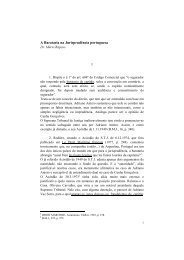



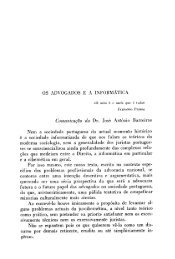
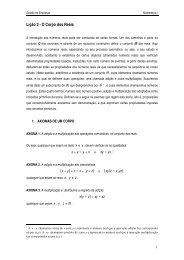

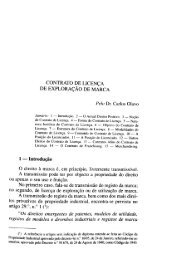
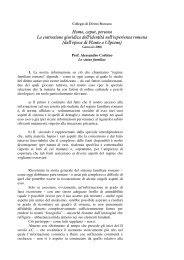
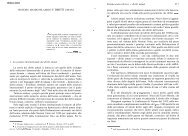

![Luigi Sapio Nozione di islām La parola “islām” [ ] è il mas.dar1 ...](https://img.yumpu.com/15836073/1/185x260/luigi-sapio-nozione-di-islam-la-parola-islam-e-il-masdar1-.jpg?quality=85)
